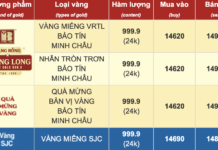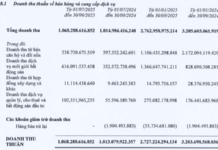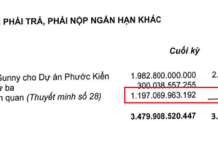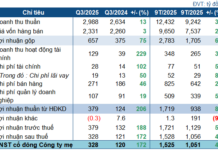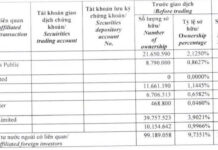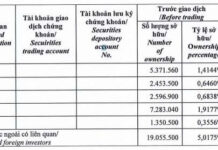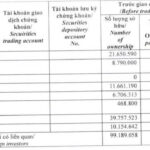On November 21, the Center for Economic and Strategic Research of Vietnam (VESS), the Social Enterprise Center for Development and Integration (CDISE), and the United Nations Development Program (UNDP) in Vietnam, with support from the Australian Department of Foreign Affairs and Trade (DFAT) and the Embassy of Ireland, organized a seminar titled “Reviewing the Disclosure of District Budgets in 2023 and a Case Study on Budget Disclosure in Public Educational Institutions in Lang Son and Ba Ria-Vung Tau Provinces.” This event was made possible through UNDP’s Provincial Governance and Public Administration Effectiveness Research Program (PAPI).
COMPLIANCE WITH BUDGET DISCLOSURE REGULATIONS REMAINS LIMITED
The study assessed the implementation of district budget disclosure on the portals and websites of 705 People’s Committees at the district level in Vietnam. It also provided insights into best practices in budget disclosure through a case study conducted in Lang Son and Ba Ria-Vung Tau provinces.
Speaking at the seminar, Ms. Do Thanh Huyen, a public policy analyst at UNDP Vietnam, shared that the annual PAPI survey results indicate a low percentage of people who are aware of or receive information about state budget revenues and expenditures in their locality.
While over 90% of citizens own smartphones with internet access, providing an opportunity for local governments to proactively disclose budget information promptly and in accordance with legal regulations, the survey aimed to understand the reasons behind this limitation.
To address this, UNDP reviewed whether district-level authorities had taken the initiative to compile and publicly display plans and results regarding budget revenues and expenditures at the district and ward/commune levels on their portals or websites.

The review of budget disclosure on the portals and websites of People’s Committees at the district level nationwide revealed that the average score for district budget disclosure in 2023 was 21.93 out of 100 points, indicating a “low” level of disclosure.
Out of the 705 districts in the country, only 12 units (1.7%) were rated as having “Good” budget disclosure practices, falling within the score range of 75 to 100 points.
In contrast, 272 units (38.6%) had a low level of disclosure (below 25 points), and notably, 168 units (23.8%) did not disclose any budget documents.
Additionally, the budget documents that were disclosed fell short of standards regarding availability, timeliness, completeness, convenience, and continuity.
Only 13.6% of districts disclosed a crucial document, the Draft District Budget Estimate for 2024, in a timely manner, failing to provide sufficient time for citizens, businesses, and other social organizations to study and contribute their opinions.
While 516 units (73.2%) had a budget disclosure folder or equivalent on their portals or websites, only 26.4% of districts had a budget folder that was categorized by document type or year.
A meager percentage of districts (below 20%) disclosed budget documents in user-friendly formats such as Word or Excel.
ACCOUNTABILITY AND EXPLANATIONS FROM AUTHORITIES ARE LACKING
The review of the “Ask and Answer” folders on the portals and websites of the People’s Committees at the district level showed that 73.3% of the 705 districts nationwide had such folders. However, only 34.5% of these folders displayed a history of activity, indicating that citizens had asked questions and received responses from government agencies.
Out of the 534 districts (75.7%) that provided email addresses, 87 (12.3%) had non-functional email addresses, and 84 (12%) did not publicly display contact email addresses on their portals or websites.
Taking the provinces of Lang Son and Ba Ria-Vung Tau as examples, the study found that the public educational institutions surveyed in these provinces generally adhered to budget disclosure regulations. In contrast, the Departments of Education and Training in the two provinces and the Divisions of Education and Training in the two cities of Lang Son and Vung Tau fell short in this regard.
The Departments of Education and Training in both provinces, along with the Divisions of Education and Training in Lang Son and Vung Tau, as well as the surveyed educational institutions, lacked dedicated folders for budget disclosure on their websites.
More notably, the Departments of Education and Training in both provinces failed to publish all the necessary documents online as required. Although they did not disclose the information on their websites, the surveyed public educational institutions reported that they had fully and timely disclosed budget-related content through meetings, messaging systems (such as Zalo), or internal electronic document systems like iOffice.
A noteworthy good practice observed was that when posting information on notice boards at their premises, these institutions maintained records of both the initiation and conclusion of the budget document disclosure process.
Based on the study’s findings, the report suggests that budget documents should be disclosed completely and promptly. The portals and websites of People’s Committees at the district level should have dedicated folders for budget disclosure, organized by year and document type, to facilitate easy access for citizens.
According to Mr. Nguyen Quang Thuong, Executive Director of CDISE, to promote compliance with budget disclosure regulations among budget-utilizing units in Vietnam, there is a need to strengthen monitoring, evaluation, and auditing of adherence to budget disclosure regulations.
Additionally, specific regulations should be enacted to recognize and commend units that excel in budget disclosure and impose penalties on those that fail to comply with legal provisions on budget transparency.








